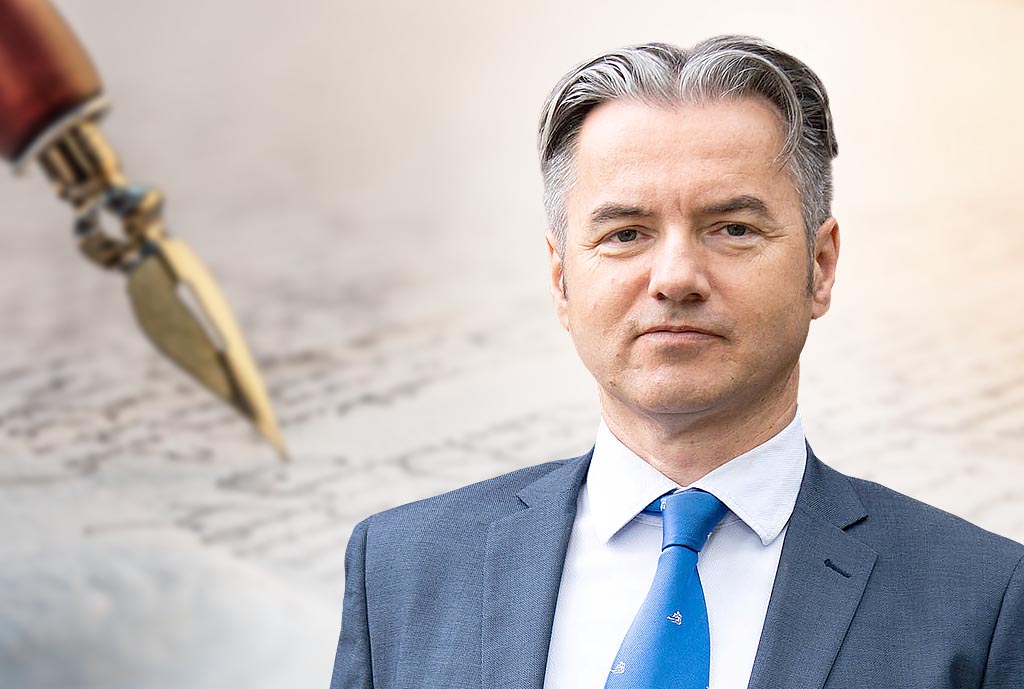By: Dr Metod Berlec
Under the rule of left-wing “freedom fighters”, the Republic of Slovenia is heading in a direction with which we cannot possibly be satisfied – a direction toward a less democratic and increasingly totalitarian state. Toward a mafia-like Balkan quasi-state, as evidenced by events from last week: from completely incompetent governance, abuse of the judiciary for political purposes, police crackdowns on protesters in front of the Celje court, one-sided regime-like reporting, to mafia-like confrontations on the outskirts of Ljubljana. When we left the heated Balkan cauldron in 1991, we never imagined that just over thirty years later, our national state would be dominated by people with a Balkan mentality who see only their own interests and those of the left-wing “new class”.
Most of them are so-called new faces who believe that political history began with them. Nonetheless, they pledge allegiance to the legacies of the previous totalitarian system and its events and personalities. Undoubtedly, this is a result of the phenomenon of “self-recruitment of elites”, described in the 1950s by the well-known American left-wing sociologist Charles Wright Mills. He argued that there is a high likelihood that the children of “elite members are recruited into elite positions themselves”. In our case, these are the children and grandchildren of those who held high, privileged positions under the previous totalitarian system. A typical example is Prime Minister Robert Golob, who was born with a silver spoon in his mouth, as his father, Valentin Golob, managed Soške elektrarne between 1976 and 2002. Entering politics from a corporate background, Golob behaves like an egomaniac who sees only himself and his interests. The same undoubtedly applies to the Speaker of the National Assembly, Urška Klakočar Zupančič, who shamelessly abuses procedural rules, violates parliamentary practices, laws, and the constitution, and behaves inappropriately toward opposition MPs. For this reason, SDS and NSi have rightly proposed her dismissal.
Protesters in front of the Celje court were justifiably critical of the judicial branch of government last week. A politically motivated trial is being conducted there against opposition leader Janez Janša in the Trenta case. How can people trust the judiciary when the Supreme Court, the highest court in the country, is led by Miodrag Đorđević, who poses with a gun for media and socialises in VIP football stands with Ljubljana’s controversial mayor, Zoran Janković? Additional shadows were cast on the police last week as officers in civilian clothing clashed with protesters in Celje. Meanwhile, Albanian immigrants in BTC celebrated noisily by firing shots into the air, and mafiosi fought among themselves. To top it off, it was revealed that Senad Jušić was appointed General Director of Police based on an illegal decision, according to an Administrative Court ruling. In typical Balkan style, he announced he would not step down, supported by Interior Minister Boštjan Poklukar. Consequently, the opposition justifiably filed a motion of no confidence against Poklukar, accusing him of living in a parallel world. A rhetorical gem came from Lena Grgurevič, an MP from the Freedom Movement and chair of the parliamentary Justice Committee, who previously worked as a senior judicial advisor at the Maribor District Court. At a press conference, she openly admitted that the judiciary “represents one of the pillars of our power”. “Without this pillar of theirs, the leftists would never win elections. Slovenia does not have an independent judiciary,” commented SDS President Janez Janša, who described the mass protest in Celje as the beginning of a “rebellion against judicial injustice”, which sent the ruling coalition into a frenzy.
Returning to Mills, he rejected the notion that members of the elite possess extraordinary qualities or psychological traits distinguishing them from the general population. Instead, he argued that institutional structures grant those at the top a monopoly on power. Certain institutions play a key role in this dynamic: corporations, the military, and federal government. In Slovenia’s case, it is the judiciary, executive power, and the segment of the economy controlled by the state or parastate entities that form the “elite of power”. However, in our context, it is a pseudo-elite. Mills also observed that the majority of the population is a passive, mute mass, “controlled by the elite of power”, which subjugates it “through psychological management and manipulation”. “For the masses excluded from positions of power, the mass media – controlled by the elite of power – dictate what they should think, feel, do, and hope for.” Disinterested in more significant current issues, the public is preoccupied with “their personal world of work, leisure, family, and neighbourhood”. “Freed from public oversight, the elite of power pursues its own interests – power and self-glorification.” Does this sound familiar? In Slovenia’s case, it certainly does. Therefore, calls for awakening are entirely appropriate!

